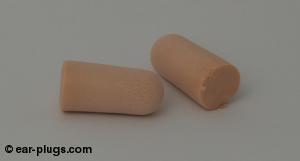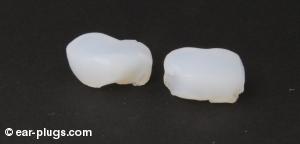Best Earplug Types and Brands for Sleeping and Why
The are four types of earplugs for sleeping: foam earplugs, mold yourself silicone or wax earplugs, custom fitted sleeping earplugs, and noise cancelling electronic earplugs. An additional fifth type are earmuffs that also have their advantages.
Each type has its advantages and disadvantages such as price, pressures in or around the ear, ease of use, and work involved to get them.
Which type is best for you depends on the usage situation and on your personal preference. If you try to sleep in a loud environment, such as an air plane or similar, you will probably want to use strong earplugs like foam earplugs.
If you try to sleep in a normal environment but are very sensitive and anything disturbs you, then foam earplugs might not be a good choice. In this case, the slight pressure the foam earplugs provide in your inner ear might be uncomfortable and you might even start to feel your blood pumping through your ears. In this case, it is better to use self-moldable silicone earplugs that do not have that pressure.
Let’s look at each type in turn.
1. Foam Earplugs
Foam earplugs are probably the first type to try. They are easy to get, use, and very cheap. They provide strong sound protection.

The best earplugs are:
- Hearos Ultimate Softness Series. They feel very soft on the skin.
- Hearos Xtreme Protection. They are very similar to the Ultimate Softness, but larger, which is helpful if the Ultimate Softness are too small for you.
- Mack’s Ultra Soft. These are also very good earplugs.
Why Foam Earplugs Might Not Be for You
Foam earplugs will put some light pressure on your ear canal once they are inserted. It is not much, but it can be perceived as uncomfortable. The pressure can be uncomfortable by itself or it puts pressure on the blood arteries in your ears, which can result in you starting to feel and hear a pulsation. If you feel that pressure, then you might want to try the mold-yourself silicone or wax earplugs as they do not have that pressure.
Foam earplugs usually provide strong sound protection. You might not like to be so much “removed” from your environment without any noises left at all. In this stillness you might start to notice a piping sound or other noises in your ears. In this case, try one of the other types.
2. Self-Moldable Silicone or Wax Earplugs
Self-moldable silicone or wax earplugs have the advantage that they do not provide any pressure on your ear once they are worn. They are somewhat more cumbersome to use as you have to mold them to fit your outer ear each time you use them.
Self-moldable silicone or wax earplugs provide medium sound protection, usually less than foam earplugs. This might be desired depending on where you use them.

The best brands are:
- Mack’s Pillow Soft. These are silicone earplugs that are cheap to buy.
There are significantly fewer brands available than for foam earplugs.
Why Self-Moldable Silicone or Wax Earplugs Might Not Be for You
They are somewhat cumbersome to use. You have to mold them each you use them. It does not take more than 60 seconds, but it is still a little more work than using foam earplugs.
They provide significant noise protection, but less than foam earplugs. If you are trying to sleep in a very loud environment, then foam earplugs might be the better choice.
They also have a shorter life span than foam earplugs. If silicone earplugs are used a few times, they will lose their stickiness and new ones are needed.
3. Custom-Made and Fitted Silicone Earplugs for Sleeping
There are companies that offer custom fitted silicone earplugs. A local ear specialist makes an imprint of your ear and the company will then produce these earplugs for you. When wearing them, you will not feel any pressure in your ears. And they are easy to use. They are probably the best choice, if money is of no concern.
For the brands, please consult your local ear specialist. You will need to go to him, anyway, in order to have him take an imprint.
Why Custom-Made and Fitted Earplugs Might Not Be for You
They cost more than all the other alternatives. You will need to go to a local ear specialist to make the imprint of your ear. At the latest after a few years, you will have to replace them as your ear might have changed and the earplugs might not fit you any more. You need to take care of them and clean them once in a while.
4. Noise Cancelling Electronic Earplugs
There are electronic noise cancelling earplugs and headphones on the market.
Why Electronic Earplugs Might Not Be for You
The main disadvantage of electronic earplugs is that you must make sure that the batteries are charged. And they are expensive.
5. Ear Muffs
Ear muffs are an easy to use alternative to earplugs. They do not provide any pressure in your ear (but around your ear they do). They have mostly medium sound protection, so you will still hear some noises, although only silently. This can be an advantage as you will not become aware of any piping or similar internal sounds in your ear. They are the easiest to put on and take off again.
Basically any brand available can be used. For the best brands for sleeping, please search the internet.
Why Earmuffs Might Not Be for You
When wearing earmuffs, you will basically have to lie on your back while sleeping the whole night. Alternatively, you only use the earmuffs when falling asleep and take them off during the night more or less unconsciously (you might not remember in the morning). Also, earmuffs put pressure around your ear, which might be felt as uncomfortable after a while.
Posted on
Last updated on